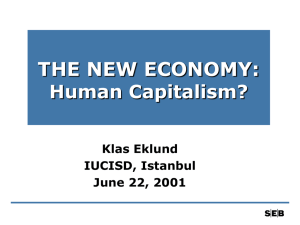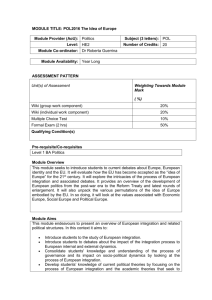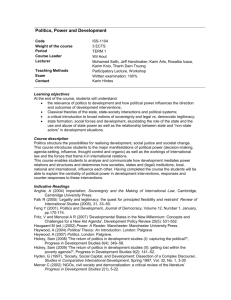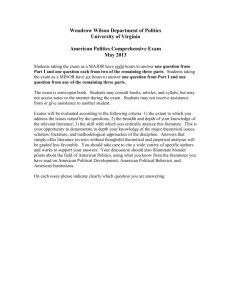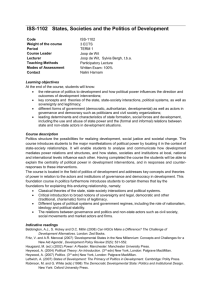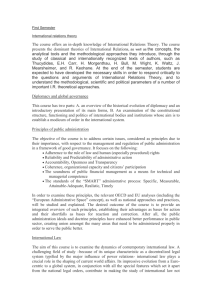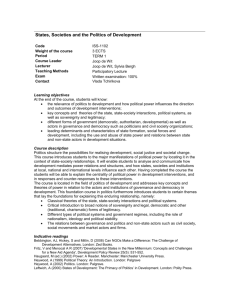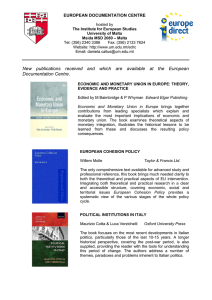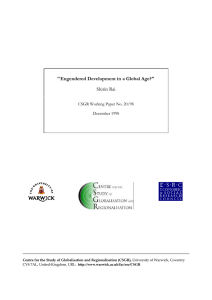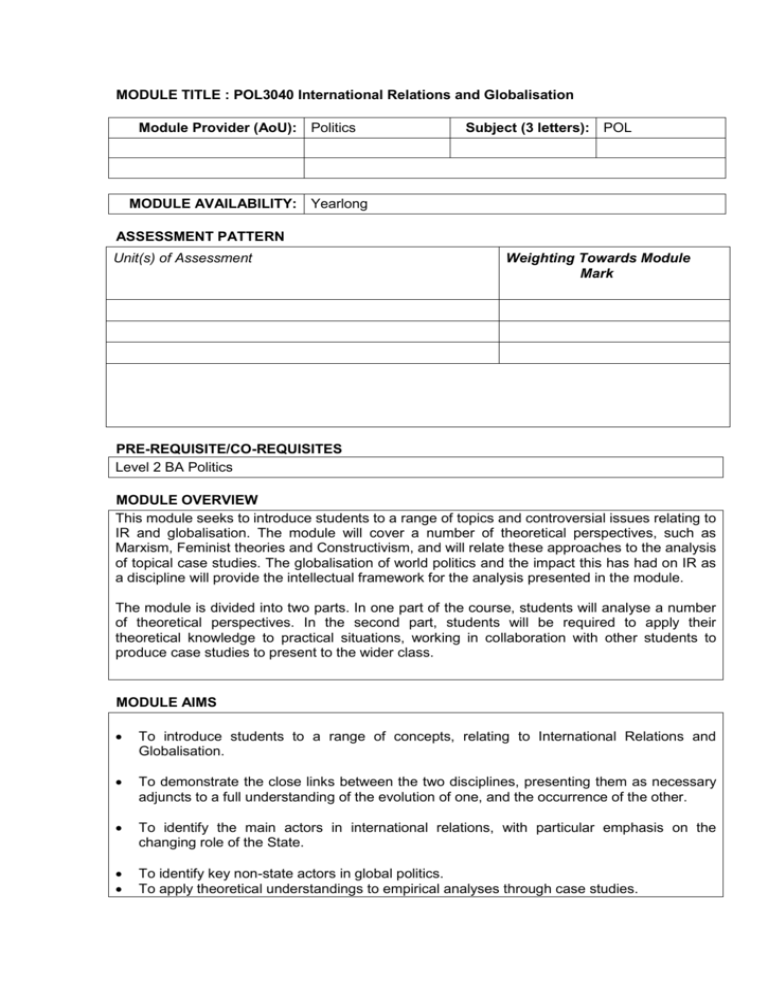
MODULE TITLE : POL3040 International Relations and Globalisation
Module Provider (AoU): Politics
Subject (3 letters): POL
MODULE AVAILABILITY: Yearlong
ASSESSMENT PATTERN
Unit(s) of Assessment
Weighting Towards Module
Mark
PRE-REQUISITE/CO-REQUISITES
Level 2 BA Politics
MODULE OVERVIEW
This module seeks to introduce students to a range of topics and controversial issues relating to
IR and globalisation. The module will cover a number of theoretical perspectives, such as
Marxism, Feminist theories and Constructivism, and will relate these approaches to the analysis
of topical case studies. The globalisation of world politics and the impact this has had on IR as
a discipline will provide the intellectual framework for the analysis presented in the module.
The module is divided into two parts. In one part of the course, students will analyse a number
of theoretical perspectives. In the second part, students will be required to apply their
theoretical knowledge to practical situations, working in collaboration with other students to
produce case studies to present to the wider class.
MODULE AIMS
To introduce students to a range of concepts, relating to International Relations and
Globalisation.
To demonstrate the close links between the two disciplines, presenting them as necessary
adjuncts to a full understanding of the evolution of one, and the occurrence of the other.
To identify the main actors in international relations, with particular emphasis on the
changing role of the State.
To identify key non-state actors in global politics.
To apply theoretical understandings to empirical analyses through case studies.
LEARNING OUTCOMES
Students will be expected to:
Develop analytical and critical skills, necessary for the application of theory to empirical
examples, in order to determine, and account for, the manner, in which actors at political
and societal levels function in the contemporary globalising world.
Identify the major themes, summarise and evaluate them on a theoretical basis.
Comment on the changing nature of international relations and global processes.
Practical skills
Form critical arguments
Manage time effectively
Develop research, writing and presentation skills.
Transferable skills
Communicate persuasively and fluently in speech and writing;
Work independently, demonstrating initiative, self-organisation and time-management;
Make appropriate use of information and communication technology.
MODULE CONTENT
Theoretically directed topics are likely to include but not be limited to:
An Historiography of International Relations
The Philosophy of the Social Sciences
The Inter-Paradigm Debate
English School and International Society
Marxism and Critical Theory
Globalisation
Postmodernism
Feminism
Empirical Analyses will include, inter alia, topics and issues such as
Humanitarianism
The role of states, IGOs and NGOs
War and conflict
Markets/Trade and Development
Migration
METHODS OF TEACHING/LEARNING
Lectures, seminars, prescribed reading, independent study, presentations.
SELECTED TEXTS/JOURNALS
Baylis, J. & Smith, S. (2005) The Globalization of World Politics. An Introduction to International
Relations 2nd ed. Oxford: Oxford University Press.
Burchill, S., Devetak, R, Linklater, A., Peterson, M., Reus-Smith, C. & True, J. (2005) Theories
of International Relations 3rd ed. Basingstoke: Palgrave.
Carlsnaes, Walter et al (2005) Handbook of International Relations. London: Sage
Dunne, T., Kurki, M. and Smith, S. (2007) International Relations Theories: Discipline and
Diversity. Oxford University Press.
Scholte, J.A. (2005) Globalization. A Critical Introduction. Houndmills: Palgrave.
Stiles, K. W. (2006) Case Histories in International Politics (6th ed) Pearson Longman.
Viotti, Paul R & Kauppi, Mark R (2006) (3 ed) International Relations and World Politics.
Security, Economy, Identity Upper Saddle River, NJ: Pearson Prentice Hall
Weber, Cynthia (2005) International Relations Theory: a critical introduction (2nd ed). London,
Routledge.
White, B et al. (2005) Issues in World Politics (3rd ed). Basingstoke, Palgrave.

